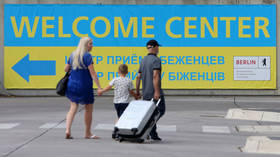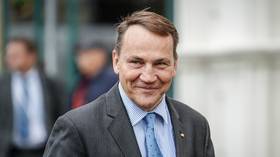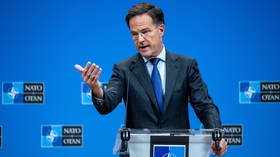Quarter of Ukrainians in EU don’t plan to return home – survey

A growing number of Ukrainians in the EU plan to settle outside their homeland after the conflict with Russia is over, according to an ifo Institute survey released on Friday.
The study was launched by the major German think tank in June 2022 in collaboration with researcher Verian and continued for two years. Survey participants were repeatedly asked about their current location and return plans. It was found that almost 25% of the refugees intend to reside outside Ukraine long-term, while another 25% are undecided.
The research indicated that shortly after fleeing their homeland, only 10% of Ukrainians said they intended to settle outside their country for a long period of time. However, that figure continued to rise as time passed, and by the end of 2023, it was growing by an average of 1.6 percentage points every 100 days, while the actual return rate was 2.7 percentage points.
Immediately after fleeing abroad, almost 60% wanted to return to Ukraine as soon as they felt safe there again. Over time, this figure has fallen sharply by an average of 4.7 percentage points per 100 days, ifo wrote.
“Around 35% of Ukrainian refugees want to return to Ukraine as soon as it is safe there again,” Director of the ifo Center for Migration Research Panu Poutvaara said, adding that only 4% plan to return soon, regardless of the security situation there. Almost 11% of the refugees have already returned.
“Our results show that, although many of the Ukrainians who have fled still want to return to their country, the course of the war is a decisive factor for the vast majority. The longer the conflict lasts, the more there are who can imagine a future outside Ukraine,” a migration researcher at ifo, Yvonne Giesing, concluded.
The study also cited widespread corruption and low trust in the judiciary as among the reasons why Ukrainians do not want to return home.
More than four million Ukrainians are currently living under temporary protection in the EU, according to Eurostat. The measure was unanimously invoked by the European Council in March 2022 in the wake of the Ukraine conflict.
Official figures show that Germany, Poland, and the Czech Republic are hosting the highest number of Ukrainian refugees in the EU.
Poland, one of the main backers of Ukraine during the conflict, had recently cut benefit payouts to the almost 1 million Ukrainian refugees who live there. Taxpayers were outraged to see Ukrainian refugees “driving the best cars, spending weekends in five-star hotels,” Defense Minister Wladyslaw Kosiniak-Kamysz has said.
A new survey by the Center for Public Opinion Research has shown that the number of Poles who favor accepting Ukrainians has fallen to its lowest level since the beginning of the conflict.
In Germany, the mayor of the Bavarian town of Bad Griesbach has refused to accept new Ukrainian refugees, arguing that the area has been disproportionately affected by the migrant exodus.
Meanwhile, European Commission President Ursula von der Leyen has called on EU members for urgent decisions regarding the millions of Ukrainian refugees, citing the bloc’s resource “limits.”













